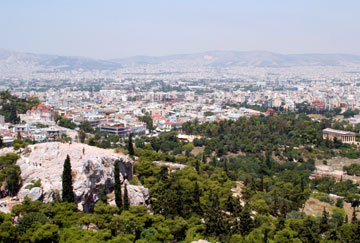« Hidden Treasure in the British Museum | Home | The Location and Environment of Ephesus »
Ancient Ephesus and the New Testament: Introduction
By Mark D. Roberts | Monday, August 6, 2007
Part 1 of series: Ancient Ephesus and the New Testament
Permalink for this post / Permalink for this series
For many of us, the events of the Bible seem to take place in some magic world of “Bible lands,” a wonderland rather like the one discovered by Alice. We read about Jerusalem, Nazareth, Corinth, and Ephesus, but picture some hazy world shaped by illustrations in our children’s Bibles. The places in which the stories of the Bible happened seem unreal, and so can the stories.
The more we actually know about the places in which the Bible was written, and in which the stories happened, the more we’ll be able to read the Bible as it was meant to be read, as the account of real experiences by real people in real places. Moreover, we’ll be able to understand the meaning of the Bible more accurately and precisely.
I’ve spent a great deal of my life studying the Bible from both an academic and a pastoral perspective. I’ve also examined in great detail many of the archeological descriptions of biblical sites. The Internet has made all of this much easier and quite wonderful, actually. (Check out sites such as http://www.holylandphotos.org/ and http://www.bibleplaces.com/). But, until this summer, I had visited only one place that could count as part of “Bible lands.” In 1984, and again in 2004, I visited Rome, the city to which Paul’s famous letter is addressed, and which is referenced in several New Testament passages. Strictly speaking, however, none of the biblical stories actually took place in Rome. (Photo to the right: The Areopagus [Mars Hill] from the Acropolis in Athens.)
 So you can imagine how excited I was to be able to visit two biblical sites this summer, Athens and Ephesus. Athens plays a minor role in the New Testament as the place where Paul preached his famous “sermon” on the Areopagus (Mars Hill). But Ephesus is arguably one of the most important of cities in early Christianity. Jerusalem probably takes first place in this competition, but Ephesus runs a close second. In the second century and beyond, of course, Rome became the most prominent city for Christianity.
So you can imagine how excited I was to be able to visit two biblical sites this summer, Athens and Ephesus. Athens plays a minor role in the New Testament as the place where Paul preached his famous “sermon” on the Areopagus (Mars Hill). But Ephesus is arguably one of the most important of cities in early Christianity. Jerusalem probably takes first place in this competition, but Ephesus runs a close second. In the second century and beyond, of course, Rome became the most prominent city for Christianity.
Why was Ephesus so significant for early Christianity? In part, this had to do with the prominence of the city itself in the first century, and its central location along the coast of Asia Minor (modern day Turkey). But, more importantly, Ephesus attracted many influential Christian leaders, including Paul, John, Timothy, and others. (Ephesus claims to be the last place where Mary, the mother of Jesus, lived, though the historical evidence for this is mixed at best.)
Prior to my visit to Ephesus, I had studied this city in great detail. It almost felt as if I had been there. So you can imagine my joy in actually seeing the extensive remains of the ancient city of Ephesus with my own eyes. This was in spite of the fact that it was well over 100 degrees on the day we visited, and there is almost no shade in the ancient city.
In the posts that follow I’ll share some of my pictures of Ephesus, and explain how our knowledge of actual city enriches our understanding of the New Testament, especially Acts 18-19. If you’ve been to Ephesus, this can serve as a helpful reminder. If you’ve never been there, consider this an introduction and invitation.
Topics: Archeology and the Bible |
Comments
Thanks for your willingness to make a comment. Note: I do not moderate comments before they are posted, though they are automatically screened for profanities, spam, etc., and sometimes the screening program holds comments for moderation even though they're not offensive. I encourage open dialogue and serious disagreement, and am always willing to learn from my mistakes. I will not delete comments unless they are extraordinarily rude or irrelevant to the topic at hand. You do need to login in order to make a comment, because this cuts down on spam. You are free to use a nickname if you wish. Finally, I will eventually read all comments, but I don't have the time to respond to them on a consistent basis because I've got a few other demands on my time, like my "day job," my family, sleep, etc.
You must be logged in to post a comment.














